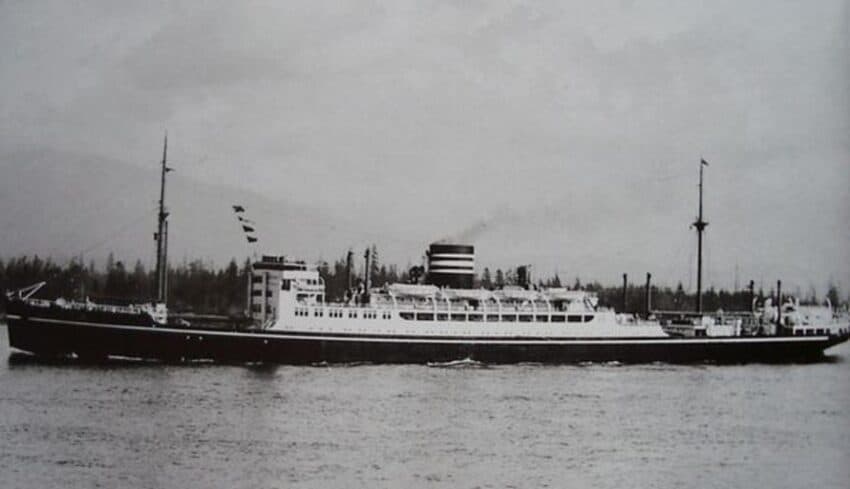By Phil Kohn. Dedicated to the memory of his father, GM3 Walter Kohn, U.S. Navy Armed Guard, USNR, and all men and women who have answered the country’s call in time of need. Phil can be contacted at ww2remembered@yahoo.com.
The Allied-controlled, Japanese passenger ship Hikawa Maru on November 2, 1945, departs Wake Island in the Pacific after embarking 1,000 Japanese troops for repatriation to their homeland. Anti-Jewish “Balfour Day” riots break out in Egypt, Syria, Lebanon and Palestine on the 28th anniversary of the Balfour Declaration. Issued by the British government in 1917, the declaration announced support for the establishment of a “national home for the Jewish people” in Palestine. (Arthur Balfour was the United Kingdom’s Foreign Secretary at the time.) In Alexandria and Cairo, Egypt, Jews and Jewish businesses are attacked. A synagogue in Cairo is torched, nine people are reported killed and over 500 are injured.
Hungary on November 3 holds general elections that result in an absolute majority for the anti-Communist Smallholders’ Party, led by Zoltán Tildy; Communists win only 17% of the available seats. Prime Minister Tildy forms a coalition government but must deal with an economic crisis due to wartime destruction, serious food shortages, rampant inflation and Soviet requisitions.
The Japanese ocean liner Hikawa Maru stops at Kusaie, Caroline Islands, on November 4 and embarks more Japanese personnel for repatriation. In British-controlled Tripolitania, western Libya, Libyan Muslims turn on Libyan Jews, killing over 140 and injuring many more. The riots — the most violent against Jews in North Africa in modern times — may have been triggered by the “Balfour Day” protests in the Middle East two days earlier. Nine synagogues are destroyed, as well as hundreds of Jewish-owned homes and buildings. British troops fire on the rioters in an attempt to restore order, and 500 are arrested over the next two days.
In the U.K., 43,000 dockworkers end their unofficial seven-week-long strike on November 5. Colombia joins the United Nations. Trials begin in Delhi for Indians accused of collaborating with the Japanese.
Soviet Foreign Minister Vyacheslav Molotov on November 6 announces that the U.S.S.R. will soon have the atomic bomb.
The U.S. Navy on November 7 decommissions USS Sable and USS Wolverine, two fresh-water aircraft carriers that were stationed in the Great Lakes to train naval aviators on carrier-based takeoffs and landings. Over England, RAF Group Capt. Hugh Wilson becomes the first man to go faster than 600 miles per hour, flying a Gloster Meteor jet fighter. His speed reaches 606.38 miles per hour.
In northeastern China, Nationalist troops on November 8 launch an offensive against Communist positions in the coastal province of Liaoning. In the Netherlands East Indies, Maj. Gen. E.C. Mansergh, the commander of British security forces in Surabaya, East Java, orders all Indonesians to lay down their arms by 6 a.m. the next morning “or face all the naval, army and air forces under my command.” Sukarno, president of the unrecognized Indonesian Republic, requests President Truman and British Prime Minister Attlee to intervene “to prevent bloodshed.” Regular civilian air traffic resumes between London and New York. In Bucharest, Romania, fighting among Romanian troops, communists and monarchists results in 13 deaths and almost 100 injuries.
USS Marlin, a submarine that patrolled the waters off the northeastern U.S. for the entire war, is decommissioned on November 9, 1945, at the Boston Navy Yard. The sub was featured (as USS Corsair) in the 1943 war film Crash Dive, starring Tyrone Power, Dana Andrews and Anne Baxter. In Bulgaria, martial law ends, and demobilization of its armed forces begins.
The Soviet Union and the Western Allies on November 10 recognize the Communist-dominated government of Albania under Gen. Enver Hoxha, who has been elected premier. The Battle of Surabaya, Netherlands East Indies, begins as British and British Indian troops methodically advance through the city under cover of naval and aerial bombardment. Fighting against Indonesian republican militia is heavy, but the British control half the city by November 13.
In Yugoslavia, Marshal Josip Broz Tito and the People’s Front win an 85% majority in the nation’s assembly in elections held on November 11. In Hanoi, the Indochinese Communist Party dissolves itself “in order to destroy all misunderstandings . . . that can hinder the liberation” of Vietnam.
Former U.S. Secretary of State Cordell Hull on November 12 wins the Nobel Peace Prize for his work in establishing the United Nations. The Institute of France awards former British Prime Minister Winston Churchill a gold medal for his activities during the War. Receiving no reply to its request for help from either President Truman or Prime Minister Attlee, the Indonesian republican government asks the Soviet Union to mediate in the conflict between the Indonesians and the British and the Dutch. British warships shell Indonesian positions in Surabaya.
On November 13, Gen. Charles de Gaulle is unanimously elected head of the French Provisional Government. The British government announces that pre-war limits on Jewish immigration to Palestine will remain in force, with total legal immigrants for 1945 capped at 13,000.
In China, Nationalist troops attack toward the Shanhai Pass of the Great Wall in the northeast on November 14. In the U.K., at Widnes, near Liverpool, a Lockheed YP-80A “Shooting Star” jet aircraft suffers engine failure and crashes while landing during a test flight.
On November 15, U.S. President Harry Truman, British Prime Minister Clement Attlee and Canadian Premier William Lyon Mackenzie King share nuclear information with the United Nations and call for establishment of a United Nations Atomic Energy Commission. In Manchuria, the Chinese Nationalists launch an offensive to stop further infiltrations and incursions by the Chinese Communists into the area.





